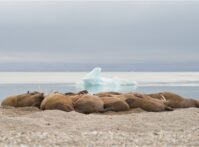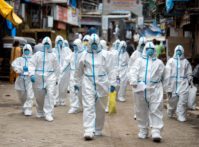-
ECSP Weekly Watch | February 10 – 14
February 14, 2025 By Breanna Crossman
A window into what we’re reading at the Wilson Center’s Environmental Change and Security Program
Declining Biodiversity May Increase Risk of Future Pandemics (Mongabay)
The COVID-19 pandemic that spread around the world in 2020 brought normal life to a standstill at many times in the past few years. But far from being a singular event, scientists and health experts warn that pandemics may become more common as biodiversity declines and spillover events become more likely.
The link between animal, human, and planetary health has long been established by scientists. But the exponential acceleration in planetary warming and habitat destruction presents a critical risk to human health that Daniel Becker, a professor at the University of Oklahoma, calls a “polycrisis.” Biodiversity loss usually leads to greater interaction between wildlife and humans, thus increasing the risk of spillovers. For instance, spillover events of zoonotic diseases rose nearly 5% each year between 1963 and 2019.
Researchers suggest further study to determine which pathogens could become virulent and infect humans. Most virus databases at presnt have significant gaps in mammal records, including known reservoir species like rodents and bats. An enhanced focus on public health and surveillance of existing zoonotic diseases are essential to preventing future pandemics.
EU and UNOPS Partner to Enhance Food Security in Sudan (Relief Web)
Ongoing conflict in Sudan has caused the world’s largest internal displacement crisis. Yet it is also creating acute food insecurity and environmental destruction. A new partnership between the EU and UN Office for Project Services (UNOPS) aims to alleviate this humanitarian crisis by supporting sustainable livelihoods in in Gedaref, Kassala and Red Sea states in Eastern Sudan.
The new €16.5 million deal will focus on building the capacity of smallholder farmers with climate-adapted practices and the construction of climate-resilient infrastructure. Over the next four years, the project expects to provide increased job opportunities for refugees and emergency cash-based support for food security.
The partnership affirmed the EU’s commitment to aiding Sudanese refugees and supporting global climate resilience efforts. The improvement in access to food, water, resources, and markets that the project may bring promises to strengthen the adaptability of rural communities and create stable livelihoods for displaced communities.
Dutch Lawsuit Aims to End Bottom Trawling in Protected Area (Mongabay)
Dogger Bank, a sandbank that once linked continental Europe and Britain in the North Sea, has long been recognized as a Marine Protected Area (MPA) for its unique biodiversity. A new lawsuit filed by four NGOs against the Dutch government has raised alarms, however, with a startling claim that extensive bottom trawling in Dogger Bank threatens marine ecosystems and makes it a “paper park.”
Bottom trawling is a fishing technique that drags weighted nets along the sea floor, and it is often criticized both for the indiscriminate catches it takes in, as well as seabed destruction. Though the UK government has banned bottom trawling in its section of Dogger Bank, the practice remains prevalent in the Dutch and German sections. Activists argue that trawling conflicts with European nations’ public commitments to marine conservation under the 30×30 pledge.
The European Commission released an action plan in 2023 that called for a ban on bottom trawling in MPAs by 2030. However, current laws are often weakly enforced and face backlash from coastal fishing communities. In an effort to bring greater attention to the issues, a coalition of 30 environmental NGOs under the banner of Seas at Risk now advocate for stronger enforcement and more formal protections for MPAs.
READ | Deadlock in the Negotiation Rooms to Protect Global Oceans | New Security Beat
Sources: Client Earth, Ethiopian Journal of Health Science, Living Planet, Marine Conversation Institute, Mongabay, Nature, Seas at Risk, UNDP
 A Publication of the Stimson Center.
A Publication of the Stimson Center.








